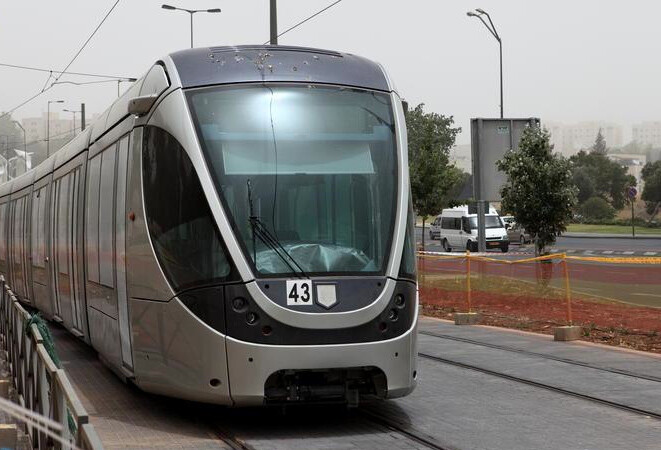The Electronic Intifada 27 June 2011

Last month a French court dismissed a lawsuit filed by France-Palestine Solidarity Association regarding the Jerusalem light rail.
ActiveStillsA French court ruling on the construction of a light rail network to service illegal Israeli settlements in occupied East Jerusalem betrays a lack of understanding about how the project abets the Israeli occupation.
On 30 May, the High Court of Nanterre dismissed a petition by the France-Palestine Solidarity Association (known by the acronym AFPS) to nullify under French law contracts signed by French transport giants Veolia and Alstom for building a light rail system in Jerusalem. AFPS has until 30 June to appeal the decision.
In its petition, AFPS asserted that the Jerusalem light rail project will connect West Jerusalem with Israeli settlements in occupied East Jerusalem, normalizing the illegal situation on the ground.
Israeli settlements in the occupied West Bank, including East Jerusalem, and the annexation of East Jerusalem are illegal under international law. Numerous UN resolutions and the 2004 advisory opinion of the International Court of Justice on Israel’s wall in the West Bank have confirmed this.
The Nanterre court found that under French law these particular international law provisions have no direct effect on private individuals and companies who are not a party to the conflict. Under French law, only states which signed the Geneva Conventions of 1949 and the Hague Regulations of 1907 can be regarded as being bound by the specific treaty provisions listed in AFPS’s legal arguments.
State responsible for French firms
The Nanterre court judgment repeatedly refers to the obligation (common to all four Geneva Conventions of 1949) on all states “to respect and ensure respect” for the terms of those treaties. The court’s ruling is therefore a reminder that states who are party to those treaties made solemn promises about protecting civilians under military occupation from violations by the occupying power.
According to French international law specialist Monique Chemillier-Gendreau, commenting on the Jerusalem light rail project in Le Monde Diplomatique, “A state is accountable for the actions of its country’s major companies if they break international law and if the state does not do what it can to prevent them” (“Jerusalem’s apartheid tramway,” 17 February 2007).
Not only is France not ensuring the respect of international law, it is actively defying it. Gerard Araud, the country’s ambassador to Israel, took part in the official Jerusalem light rail contract-signing ceremony in the offices of then Prime Minister Ariel Sharon. On that occasion, Sharon made it clear that the light rail would “sustain Jerusalem for eternity as the capital of the Jewish people, the united capital of the state of Israel” (“PM Sharon’s Statements at the Ceremony for the Signing of the Light Train Agreement,” Israeli Prime Minister’s Office, 17 July 2005).
France should be held to account for disregarding its responsibilities towards the involvement of Veolia and Alstom in Israel’s illegal activities in the occupied West Bank.
Racist survey
The court did not rule on the claims by the companies that the light rail system was being built for the benefit of all local residents, without discrimination. However, the court’s comments about the project being designed to “serve many districts of Jerusalem and all its inhabitants, including tourists” indicates a lack of understanding of the underlying nature of the service, going beyond its obvious utility to the illegal settlements.
The court’s comments echo the conclusions of a dubious survey undertaken by Veolia itself. Last year even Israeli municipal officials branded the questions posed during that survey as “racist.” Jewish respondents were asked, for example, if they would be comfortable sharing the service with Palestinians.
In addition, statements made by Ammon Elian, a spokesperson for the CityPass consortium to which Veoila and Alstom belong, show that the project will entrench the status quo of segregation. With the exception of one stop, the line has been explicitly designed to avoid servicing parts of Jerusalem with a Palestinian majority.
It is also unlikely that Palestinians will use the light rail system when local bus routes are more convenient for their journeys and much cheaper.
Wriggling out of ethical code
Veolia and Alstom both participate in the UN Global Compact, a strategic policy initiative for businesses that are committed to operating in an ecologically and socially responsible manner. Its first two principles state that businesses should support and respect the protection of international human rights within their spheres of influence, and make sure they are not complicit in human rights abuses.
In its petition, AFPS claims that Veolia violated its own code of ethics, which refers to the principles in the UN Global Compact. But in its submissions to the court, Veolia countered these accusations by claiming that “the code of ethics is not a contract and therefore has no legal effect.”
Veolia contended that the reference to the Global Compact in its code of ethics refers exclusively to the relations between the company and its employees. The court found that Veolia had only expressed its intention to comply with the obligations contained in the code of ethics, instead of committing itself to respecting these obligations.
Meanwhile, Alstom argued that “the Global Compact is simply an invitation to participants to respect, inter alia, the United Nations Universal Declaration of Human Rights.” Its own championing of a code of ethics bound it “merely [to] obligations of care and diligence, rather than obligations to produce specific results.”
Furthermore, the court found that the Global Compact does not include a specific definition of human rights and that it uses terms that amount merely to encouraging firms to behave in a particular way.
Veolia and Alstom advertise their commitment to the ten principles of the Global Compact on their websites. Rather than holding the companies to account for violating their commitments laid down in the Code of Ethics and the Global Compact, the court accepted the plea by the companies that they are not bound by these commitments.
The court’s findings on the status of ethical codes constitute a judicial failure to treat these publicly-adopted standards of conduct as having legal consequences. Corporations, in approving these standards, are expressing a clear willingness to be held to account for their conduct. Moreover, it is simply baffling that Alstom and the court failed to find any of those standards applicable to the Jerusalem light rail project. This flies in the face of significant evidence of the impact of the system on Palestinians’ human rights.
If these aspects of the ruling are not challenged now or in future, then it will be all too easy for companies to publish codes of ethics for the purposes of public relations alone, without ever being legally required to implement those codes at all levels of their business, and within their whole supply chain.
Daniel Machover is a lawyer, based in the UK, and co-founder of Lawyers for Palestinian Human Rights.
Adri Nieuwhof is a consultant and human rights advocate based in Switzerland





